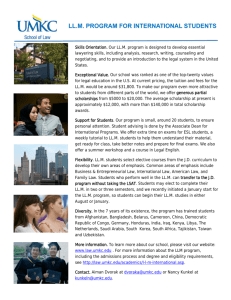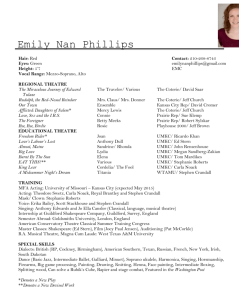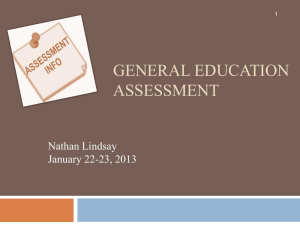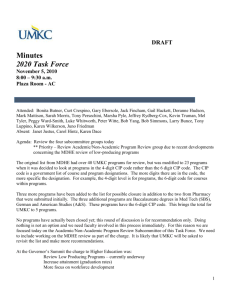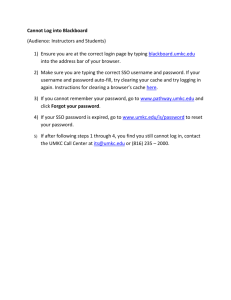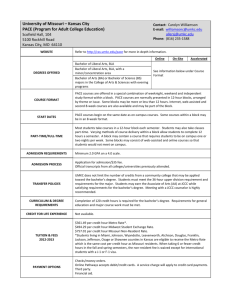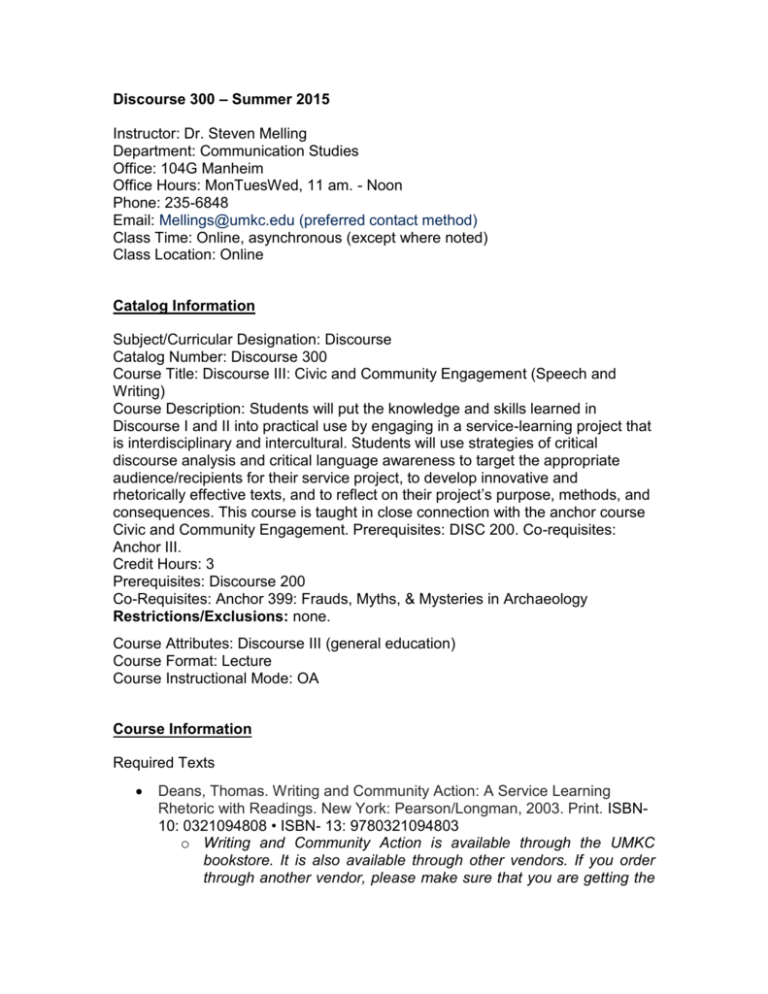
Discourse 300 – Summer 2015
Instructor: Dr. Steven Melling
Department: Communication Studies
Office: 104G Manheim
Office Hours: MonTuesWed, 11 am. - Noon
Phone: 235-6848
Email: Mellings@umkc.edu (preferred contact method)
Class Time: Online, asynchronous (except where noted)
Class Location: Online
Catalog Information
Subject/Curricular Designation: Discourse
Catalog Number: Discourse 300
Course Title: Discourse III: Civic and Community Engagement (Speech and
Writing)
Course Description: Students will put the knowledge and skills learned in
Discourse I and II into practical use by engaging in a service-learning project that
is interdisciplinary and intercultural. Students will use strategies of critical
discourse analysis and critical language awareness to target the appropriate
audience/recipients for their service project, to develop innovative and
rhetorically effective texts, and to reflect on their project’s purpose, methods, and
consequences. This course is taught in close connection with the anchor course
Civic and Community Engagement. Prerequisites: DISC 200. Co-requisites:
Anchor III.
Credit Hours: 3
Prerequisites: Discourse 200
Co-Requisites: Anchor 399: Frauds, Myths, & Mysteries in Archaeology
Restrictions/Exclusions: none.
Course Attributes: Discourse III (general education)
Course Format: Lecture
Course Instructional Mode: OA
Course Information
Required Texts
Deans, Thomas. Writing and Community Action: A Service Learning
Rhetoric with Readings. New York: Pearson/Longman, 2003. Print. ISBN10: 0321094808 • ISBN- 13: 9780321094803
o Writing and Community Action is available through the UMKC
bookstore. It is also available through other vendors. If you order
through another vendor, please make sure that you are getting the
correct edition.
Schreiber, Lisa (ed.). Public Speaking: The Virtual Text. The Public
Speaking Project, 2011. Web. 2 May 2014.
o Public Speaking is available for free online, at
http://publicspeakingproject.org/psvirtualtext.html
In addition to assigned readings from the textbooks, students will complete
online reading assignments.
Technical Requirements
* YouTube Account. Students are encouraged to use YouTube to record and
Post their Practice Speeches, Introduction Speech and Speech One.
To view technical requirements for using the Blackboard online platform,
go to the University’s IS office http://www.umkc.edu/is/. Hardware,
Software, and Multimedia
Individual courses may require additional
software or plug-ins in order to view and interact with content. The
information under Course Home will list all software requirements for each
course, but common software and multimedia add-ons are listed below.
Adobe Flash Player
Adobe Reader- for reading PDF files
Java
Open Office- a free, open source alternative to Microsoft Office
Microsoft Office PowerPoint Viewer
Microsoft Windows 2007 Compatibility Pack
QuickTime– media player
RealPlayer– media player
Webcam with microphone
Windows Media Player
Discourse 300 Core Assessment
Though there are different sections and instructors of Discourse 300, certain
general expectations apply to every course: Discourse 300 students are required
to research, draft, develop and complete a minimum of 24-28 pages including at
least two research essays, one of which will be related to the material from the
associated Anchor III course in Community and Civic Engagement. Students are
also required to research, draft, develop and present at least two formal
speeches with a combined minimum total of 18-20 minutes. This work will be
presented in a final summative portfolio at the end of the term. Constructive
feedback and opportunities for comprehensive revision will be provided
throughout. All formal work, written and spoken, will be graded using a rubric that
applies the SLOs for Communications Skills and Information Literacy.
RooWriter
As stated in the UMKC catalog, candidates for all baccalaureate degrees must
take the UMKC RooWriter writing assessment before they have completed 90
credit hours. Students may take the RooWriter at any time while enrolled at
UMKC as a personal diagnostic, but it will only satisfy the undergraduate
graduation requirement after a student has completed Discourse 200 (or
equivalent). You can find previous editions of the catalog here. RooWriter also
appears as a degree requirement on your major map and on your DARS report.
As you prepare for completing your undergraduate degree and life beyond
UMKC, it is important to recall the value of transferrable skills, including written
communication. According to the National Survey of Business and Nonprofit
Leaders: Key Findings, “When hiring recent college graduates, employers place
the greatest priority on a demonstrated proficiency in skills and knowledge that
cuts across majors. Of 17 outcome areas tested, written and oral
communication, teamwork skills, ethical decision-making, critical thinking,
and the ability to apply knowledge in real-world settings are the most highly
valued by employers. More than 8 in 10 employers give these outcomes a rating
between 8 and 10 on a 10 point scale.” The feedback you receive from the
RooWriter Assessment will give you insight into how well you communicate with
others, a critical piece of information for succeeding in your college courses and
obtaining employment as a college graduate.
RooWriter offers a current assessment of how prepared you are for the rigorous
reading and writing requirements of an Anchor and Discourse 300 course that
assumes completion of the Discourse II class in the 30-hour General Education
Program. Also, Anchor and Discourse 300 instructors will have access to the
RooWriter reports for students enrolled in their course, so they can efficiently
provide writing advice and assistance throughout the course.
Overview of Learning Activities
Introduction Speech: Students will have a chance to introduce themselves to the
class, using the framework of civic and community engagement.
Discussion Thread: Questions will be posed to students based on class reading,
current events, or material from the Anchor course. The student must not only post
a response to the question(s), but must reply to at least three other peer postings.
Rough Draft/Practice speeches and Peer Reviews: Post rough drafts of essays
and practice versions of speeches. Students will comment on peers’ drafts and
receive comments on their drafts.
Journals: Short, informal writing assignments where students reflect on course
concepts, readings, and/or videos.
Information University 300: A brief tutorial on conducting scholarly research.
Overview of Learning Assessments
•
One Shorter Essay: A 6-7 pages.
•
One Shorter Speech: A 4-6 minute speech.
•
Annotated Bibliography: Ten sources are summarized and cited in APA
style.
•
Research Essay: A 10-12 page research essay, using at least six
scholarly
sources, and four popular sources.
•
Research Presentation: Students present their research to class in a 1215 minute speech.
•
Capstone Reflection Essay: A two-page essay where students reflect on
their writing habits and process.
•
Final Portfolio:
Assignments and Point Totals
Intro Speech:
Rough Drafts:
Practice Speeches:
Speech One:
Essay One:
Journals:
Discussion:
Research Essentials:
Annotated Bibliography:
Research Presentation:
Research Essay:
Capstone Essay/Portfolio:
Total:
Grade Distribution
A = 930-1000
A- = 900-929
B+ = 870-899
20 points
50 points
50 points
50 points
50 points
180 points
140 points
10 points
100 points
100 points
150 points
100 points
1,000 points
B = 830-869
B- = 800-829
C+ = 770-799
C = 730-769
C- = 700-729
D+ = 670-699
D = 630-669
D- = 600-629
F = 0-599
Tentative Schedule. Assignments are due at 11:59 pm on the date listed.
PS = Public Speaking
WCA = Writing and Community Action
Links provided for other readings.
Week
Day
Reading and Videos
Assignments
Week
Mon
Syllabus
One
6/8
Introduction Speech Assignment
Tues
6/9
WCA: Chs. 1, 3
PS: Ch. 1
Journal One
Discussion Board
One Thread
Wed
6/10
“Contextualizing Plagiarism: Comparing
Policies” available at
https://owl.english.purdue.edu/owl/resource/
929/15/
“Types of Information Sources” available
at http://www.lib.vt.edu/help/research/infosources.html
“Is it Scholarly?” available at
http://www.library.illinois.edu/ugl/howdoi/sch
olarly.html
“Looking for Articles in Journals and
Magazines: Scholarly or Popular?” available
at
https://library.uoregon.edu/guides/findarticle
s/distinguish.html
Discussion Board
One Responses
Thurs
6/11
Week
Two
Fri
6/12
Mon
6/15
Journal Two
Discussion Board
Two Thread
Discussion Board
Two Responses
PS: 3-4 through 3-8:
http://publicspeakingproject.org/PDF%20File
s/ethics%20web% 201%20gs.pdf
Watch:
http://www.youtube.com/watch?v=Bm7Tklcp
KI4&feature=youtu.be
“Speech Outlining and Extemporaneous
Delivery”:
http://publicspeakingproject.org/PDF%20File
s/Organizing%20W eb%201.pdf
Tues
6/16
WCA Ch. 2
Wed
6/17
Thurs
6/18
Discussion Board
Three Responses
Journal Four
Discussion Board
Four Thread
Discussion Board
Four Responses
Fri
6/19
Week
Three
Mon
6/22
WCA Ch. 4
Michael Schudson: “Good Citizens and Bad
History: Today’s Political Ideals in Historical
Perspective”
http://proxy.library.umkc.edu/login?url=http://
search.ebscohost.com/login.aspx?direct=tru
e&db=ufh&AN=3803351&site=ehostlive&scope=site
Research Essentials
Tues
6/23
Joseph Campbell: “The Historical
Development of Mythology”:
http://www.jstor.org/stable/20026493
Journal Five
Discussion Board
Five Post
Wed
6/24
Thurs
6/25
Week
Four
Journal Three
Discussion Board
Three Thread/
Post Introduction
Speech
Fri
6/26
Discussion Board
Five Responses
Journal Six
Discussion Board
Six
Discussion Board
Six Responses
Mon
6/29
Speech One
Practice Version
Tues
6/30
Watch: Amy Cuddy’s TED Talk:
http://www.ted.com/talks/amy_cuddy_your_
body_language_shapes_who_you_are
Journal Seven
Discussion Board
Seven Post
Wed
7/1
Thurs
7/2
WCA Ch. 5
Discussion Board
Seven Responses
Speech One Final
Discussion Board
Eight Post
Fri
7/3
Week
Five
Mon
7/6
Discussion Board
Eight Responses
Walter Fisher: “Reaffirmation and
Subversion of the American Dream”:
http://proxy.library.umkc.edu/login?url=http://
search.ebscohost.com/login.aspx?direct=tru
e&db=ufh&AN=9936956&site=ehostlive&scope=site
Essay One Draft
Stephanie Kelley-Romano: “Mythmaking in
Alien Abduction Narratives”:
http://proxy.library.umkc.edu/login?url=http://
search.ebscohost.com/login.aspx?direct=tru
e&db=ufh&AN=22898096&site=ehostlive&scope=site
Week
Six
Tues
7/7
WCA Chs. 7 & 9
Wed
7/8
Thurs
7/9
WCA Ch. 8
Mon
7/13
Tues
7/14
Wed
7/15
Thurs
7/16
Watch: Devdutt Pattanaik’s TED Talk:
http://www.ted.com/talks/devdutt_pattanaik
Journal Eight
Discussion Board
Nine Post
Discussion Board
Nine Responses
Essay One Final
Discussion Board
Ten Post
Discussion Board
Ten Responses
Annotated
Bibliography
Discussion Board
Eleven
Journal Nine
Discussion Board
Eleven Responses
Journal Ten
Week
Seven
Discussion Board
Twelve Post
Discussion Board
Twelve Responses
Research Essay
Draft
Mon
7/20
Tues
7/21
Watch: Benjamin Barber’s TED Talk:
http://www.ted.com/talks/benjamin_barber_
why_mayors_should_rule_the_world
Wed
7/22
Week
Eight
Discussion Board
Thirteen Responses
BlackBoard
Collaborate Practice
Sessions
Research Essay
Final
Research
Presentation
Practice Version
Thurs
7/23
Mon
7/27
Tues
7/28
Journal Eleven
Discussion Board
Thirteen Post
Watch: Maajid Nawaz’s TED Talk:
http://www.ted.com/talks/maajid_nawaz_a_g
lobal_culture_to_fight_extremism
Wed
7/29
Thurs
7/30
Fri
7/31
Journal Twelve
Discussion Board 14
Research
Presentations
Research
Presentations
Final Portfolio and
Capstone Essay
Students will demonstrate an ability to:
Engage a community problem through multiple forms of discourse.
Apply discourse analysis and language awareness.
Use written and oral discourse to develop and present meaningful and
interesting ideas that show the students’ voices, a willingness to take
intellectual risks, and an ability to contribute to an academic conversation.
Communicate skillfully in several genres and in response to the needs of
different audiences.
Create discourse through an advanced process that includes editing,
proofreading, and revising multiple drafts.
Evaluate their own and others' works and plan their own development as
producers of discourse.
Locate, evaluate, organize and use research material from a broad range
of sources and weave such sources into a longer interdisciplinary
research project
Masterfully cite sources in a consistent professional style (MLA, APA,
Chicago, etc.) and understand differences between citation styles.
Course Policies
Late Work: You are expected to submit your work by the due date. Please let
me know if you experience extenuating circumstances that prevent you from
submitting your assignments on time. However, I reserve the right to determine
whether circumstances justify an extension. In some cases you may be asked to
present documentation to substantiate an excused absence.
If you miss a deadline for an unexcused reason, you may submit your work for
partial credit within one week of the original deadline. You will receive a 20%
deduction for the assignment.
Civil Behavior: Throughout this course you will be exposed to a wide range of
ideas, from both the course material and your classmates. I encourage you to
express your disagreement with opinions you encounter, but you must do so in a
manner that is both civil and respectful. This is a crucial component of living with
a healthy democracy.
If you fail to follow this policy, I reserve the right to delete posts that I deem
disrespectful to other students. This will also result in a grade of “0” for the
related assignment.
Resources & Policy Statements
Academic Calendar: Students are encouraged to review important add, drop or
withdraw dates: http://www.umkc.edu/registrar/acal.asp
Academic Honesty: The Board of Curators of the University of Missouri
recognizes that academic honesty is essential for the intellectual life of the
University. Faculty members have a special obligation to expect high standards
of academic honesty in all student work. Students have a special obligation to
adhere to such standards. Academic dishonesty, including cheating, plagiarism
or sabotage, is adjudicated through the University of Missouri Student Conduct
Code and Rules of Procedures in Student Conduct Matters.
(Academic units may have additional student codes of behavior to be
referenced, i.e. Honor Codes.)
Academic Inquiry, Course Discussion and Privacy: (Choose one of the
following to include in the syllabus-- Faculty allowing recording or Faculty not
allowing recording.)
Faculty allowing recording - University of Missouri System Executive
Order No. 38 lays out principles regarding the sanctity of classroom
discussions at the university. The policy is described fully in Section
200.015 of the Collected Rules and Regulations. In this class, students
may make audio or video recordings of course activity unless specifically
prohibited by the faculty member. However, the redistribution of any audio
or video recordings of statements or comments from the course to
individuals who are not students in the course is prohibited without the
express permission of the faculty member and of any students who are
recorded, including those recordings prepared by an instructor. Students
found to have violated this policy are subject to discipline in accordance
with provisions of Section 200.020 of the Collected Rules and Regulations
of the University of Missouri pertaining to student conduct matters.
(OR)
Faculty not allowing recording - University of Missouri System
Executive Order No. 38 lays out principles regarding the sanctity of
classroom discussions at the university. The policy is described fully in
Section 200.015 of the Collected Rules and Regulations. In this class,
students may not make any audio or video recordings of course activity
(including those recordings prepared by an instructor), except students
permitted to record as an accommodation under Section 240.040 of the
Collected Rules. All other students who record and/or distribute audio or
video recordings of class activity are subject to discipline in accordance
with provisions of Section 200.020 of the Collected Rules and Regulations
of the University of Missouri pertaining to student conduct matters.
Those students who have written permission from the course instructor to
record are not permitted to redistribute any audio or video recordings of
statements or comments from the course to individuals who are not
students in the course without the express permission of the faculty
member and of any students who are recorded, including those recordings
prepared by an instructor. Students found to have violated this policy are
subject to discipline in accordance with provisions of Section 200.020 of
the Collected Rules and Regulations of the University of Missouri
pertaining to student conduct matters.
Attendance Policy: Students are expected to attend and participate in classes.
Advance notice of attendance policies of academic units and individual
instructors should be given, and such notice should be in writing. Students
should notify instructors of excused absences in advance, where possible.
Students who have an excused absence are expected to make arrangements
with instructors for alternative or make-up work. Such arrangements should be
made in advance of the absence, where possible. Instructors should
accommodate excused absences to the extent that an accommodation can be
made that does not unreasonably interfere with the learning objectives of the
course or unduly burden the instructor. Attendance policies shall be applied in a
non-discriminatory manner.
Campus Safety: Inclement weather, mass notification, and emergency response
guide: http://www.umkc.edu/umkcalert/
Counseling and Health Services Available at UMKC: UMKC students may
experience many challenges in their lives while attending college – stress,
depression, suicidality, trauma, relationship issues, health concerns, etc. As your
professor I care about your success and well-being, and want to make you aware
of some helpful resources on campus. The UMKC Counseling Center
(www.umkc.edu/counselingcenter), located at 4825 Troost in Room 206, offers a
wide range of supportive services to students. Appointments can be made by
calling 816.235.1635. UMKC Student Health and Wellness
(http://info.umkc.edu/studenthealth/), located at 4825 Troost in Room 115, offers
a full range of health care and promotion services. Appointments can be
scheduled online or by calling 816.235.6133. The MindBody Connection
(www.umkc.edu/mindbody) is located in the Atterbury Student Success Center in
Room 112 and offers a variety of stress-reduction services.
Disability Support Services: To obtain disability related accommodations
and/or auxiliary aids, students with disabilities must contact the Office of Services
for Students with Disabilities (OSSD) as soon as possible. To contact OSSD, call
(816) 235-5696. Once verified, OSSD will notify the course instructor and outline
the accommodation and/or auxiliary aids to be provided. For more information
go to: http://www.umkc.edu/disability/
English Proficiency Statement: Students who encounter difficulty in their
courses because of the English proficiency of their instructors should speak
directly with their instructors. If additional assistance is needed, students may
contact the UMKC Help Line at 816-235-2222 for assistance.
Grade Appeal Policy: Students are responsible for meeting the standards of
academic performance established for each course in which they are enrolled.
The establishment of the criteria for grades and the evaluation of student
academic performance are the responsibilities of the instructor.
The University grade appeal procedure is available only for the review of
allegedly capricious grading and not for review of the instructor's evaluation of
the student's academic performance. Capricious grading, as that term is used
here, comprises any of the following:
• The assignment of a grade to a particular student on some basis other than the
performance in the course;
• The assignment of a grade to a particular student according to more exacting or
demanding standards than were applied to other students in the course; (Note:
Additional or different grading criteria may be applied to graduate students
enrolled for graduate credit in 300- and 400-level courses.)
• The assignment of a grade by a substantial departure from the instructor's
previously announced standards.
Discrimination Grievance Procedures for Students: Discrimination Grievance
Procedures for Students can be found here:
http://www.umsystem.edu/ums/rules/collected_rules/grievance/ch390/grievance_
390.010
Statement of Human Rights: The Board of Curators and UMKC are committed
to the policy of equal opportunity, regardless of race, color, religion, sex, sexual
orientation, national origin, age, disability and status as a Vietnam era veteran.
Commitment to the policy is mentored by the Division of Diversity, Access &
Equity, but it is the responsibility of the entire university community to provide
equal opportunity through relevant practices, initiatives and programs.
Title IX: Under the University of Missouri’s Title IX policy, discrimination, violence
and harassment based on sex, gender, and gender identity are subject to the
same kinds of accountability and support applied to offenses based on other
protected characteristics such as race, color, ethnic or national origin, sexual
orientation, religion, age, ancestry, disability, military status, and veteran status. If
you or someone you know has been harassed or assaulted, you can find the
appropriate resources by visiting UMKC’s Title IX Office webpage
(http://info.umkc.edu/title9/) or contacting UMKC’s Title IX Coordinator, Mikah K.
Thompson (816.235.6910 or thompsonmikah@umkc.edu). Additionally, you can
file a complaint using UMKC’s online discrimination complaint form, which is
located at http://info.umkc.edu/title9/reporting/report-online/.
While most UMKC employees are required to report any known or suspected
violation of Title IX, students may seek confidential guidance from the following
campus locations:
UMKC Counseling
UMKC Counseling
Student Health and
Service
Service
Wellness
Volker Campus
4825 Troost Ave, Suite
206
Kansas City, MO 64110
Phone – (816) 235-1635
Health Sciences
Campus
Health Sciences Building
1418
2464 Charlotte
Kansas City, MO 64108
Phone – (816) 235-1635
(open Tuesdays, 1-5pm)
4825 Troost Ave., Suite
115
Kansas City, MO 64110
Phone - (816) 235-6133
UMKC Connect: Important information is available to undergraduate students in
UMKC Connect accessed through Blackboard. Throughout the term, students
may receive emails regarding course grades or academic performance. Students
are expected to address information posted in a timely fashion. This information
may be shared with the student’s Success Network made up his or her academic
advisor(s) and other campus resources so that UMKC may fully support the
student’s success.
College of Arts & Sciences Course Policies & Resources
Please refer to the following web page and the linked resources for critical
information regarding course policies and resources. You are expected to abide
by all the rules and regulations regarding student conduct referenced in these
pages.
http://cas.umkc.edu/CPR/

